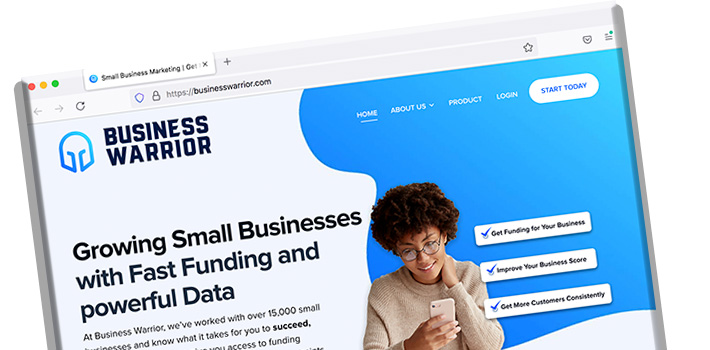Business Lending
Clearco Announces Major Layoffs, Paints Gloomy Picture
July 29, 2022Clearco, the international small business funding company led by celebrity CEO Michele Romanow, announced it was laying off 125 employees on Friday. Romanow shared the news on social media in an overall gloomy message about the business’ state of affairs. For one, the company says that Clearco is currently “considering strategic options” for its international operations.
In a letter from Romanow and Executive Chairman Andrew D’Souza, they state:
The short answer is the current macroeconomic environment looks very different today than in 2021. We have rising interest rates not seen since the mid-90s, the highest inflation in four decades, one of the biggest swings in European currency since the founding of the Euro, all compounded with a slowdown in e-commerce growth that’s been well documented and continued supply chain issues for companies of all sizes.
We were building to match the growth of the economy and now face significant headwinds that simply didn’t exist six months ago. We grew our headcount too quickly in anticipation of continued economic growth and that decision rests on us alone.
After assessing the current market conditions and uncertainty we’re seeing across the e-commerce sector, this was the most prudent action to take and was necessary to:
1. Ensure we’re able to support as many founders as possible, today and in the future, in their growth journey and;
2. To come out of this economic downturn a sustainable and profitable company.
Enova Originated $679M in Small Business Loans in Q2
July 28, 2022 Enova announced another strong quarter on Thursday. Net income for the second quarter was $52M.
Enova announced another strong quarter on Thursday. Net income for the second quarter was $52M.
Business lending originations were up, increasing 3% quarter over quarter to $679M. During the earnings call, Enova CEO David Fisher spoke glowingly about the company’s marketing capabilities and overall loan growth.
“We are pleased to report continued strong loan growth and solid credit metrics across our portfolio,” he said. “We have successfully demonstrated our ability to quickly adapt to changes, including shifting macro-economic conditions. We continue to see strength in consumers and small businesses as high employment and rising wages provides an ideal backdrop for solid credit performance. Looking forward, we are confident that our highly flexible, online-only business model and well-diversified portfolio positions us well to continue to drive profitable growth while also effectively managing risk.”
Turning Businesses into Funding Warriors
July 27, 2022 The downside to offering any small business a loan to grow is that they might not necessarily know how to do the growing part. And so for years, that’s what a Tempe, AZ headquartered company called Business Warrior had been focused on, helping small businesses grow and become more profitable. If businesses needed funding, Business Warrior could certainly provide that too, but the key was in maximizing the value of that.
The downside to offering any small business a loan to grow is that they might not necessarily know how to do the growing part. And so for years, that’s what a Tempe, AZ headquartered company called Business Warrior had been focused on, helping small businesses grow and become more profitable. If businesses needed funding, Business Warrior could certainly provide that too, but the key was in maximizing the value of that.
It all seemed a swell fit until the company became further intrigued by the value proposition of one of its vendors, Alchemy, an “embedded finance” company headquartered in nearby California. deBanked had interviewed Alchemy CEO Timothy Li via Zoom back in August 2020 and the tech company had only grown since then. After reconnecting in April of this year, Li described Alchemy as the “Salesforce of embedded finance.”
Embedded Finance sounds altogether buzz-wordy, but Business Warrior smelled opportunity. In June, Business Warrior announced that it had acquired Alchemy. Since then, Alchemy’s Li has become a warrior and he is working hard to roll out Business Warrior’s next generation of products.
Among the first on the horizon is an Alchemy specialty, giving small businesses the tools to become lenders themselves. It sounds like Buy-Now-Pay-Later, and to an extent it is, but the difference is that a furniture store, doctor’s office, or repair shop would be the one extending the credit, not a faceless third party on Wall Street hoping to win big.
Li explained the advantage of this by using a doctor’s office as an example. “So the creditors, the banks, don’t understand [the customer] just from reading the credit report, but the doctors understand them, they’re local people, they might have seen this patient before,” said Li. “Now [that patient] wants to do a $10,000 procedure and nobody under the sun will underwrite them.” When this happens, the doctor’s office might try to arrange some type of private financing arrangement, “but they don’t have the software to do it,” Li stated.
 Business Warrior’s software solves this. The platform will be free for the business and Business Warrior will process the customer payments, which is where they’ll earn their revenue, on transactions fees.
Business Warrior’s software solves this. The platform will be free for the business and Business Warrior will process the customer payments, which is where they’ll earn their revenue, on transactions fees.
In one respect it reduces two risks for the business: (a) A third party BNPL lender dictating future approval, supply, and cost of financing, and (b) credit card companies cutting the lines of their customers that they would otherwise normally use to pay for services. The downside, so to speak, is that the business itself is tasked with being its customers’ creditor.
But ultimately, just like BNPL, such a service is likely to lead to a boost in sales, which is what Business Warrior’s mission had always been from the start.
“This tool is a tool for the small business to do more business,” Li said.
The Alchemy name will remain as far as Li knows, because they still have a lot of customers using its original products. Day to day now, Alchemy is also working with Helix House, an online marketing company that Business Warrior also acquired. They’re all leveraging each other’s resources.
Li concluded the interview by sharing a recent real world experience, he himself going to a dental office to get some work done.
“They have every single imaginable technology, schedule appointments, all the tech,” he said. “They don’t have something that manages payments. It’s either a credit card, cash, or it’s nothing.”
Referring to the financing capabilities that Business Warrior can bring to the table in those very circumstances, “I feel like it should have been there already.”
Shopify Capital Originated $416.4M in MCAs and Loans in Q2
July 27, 2022 Shopify Capital originated $416.4M in funding to small businesses in Q2, the company announced. That was spread across the US, Canada, and the UK. The figure represented a large increase over the $346.7M in Q1.
Shopify Capital originated $416.4M in funding to small businesses in Q2, the company announced. That was spread across the US, Canada, and the UK. The figure represented a large increase over the $346.7M in Q1.
Although its funding business grew, the overall parent company announced that it was laying off 10% of its employees. The CEO explained that this was a correction to its expectations that pandemic-driven e-commerce sales would continue to soar for a long time, but that they have instead slowed.
DailyFunder Marks 10 Year Anniversary
July 26, 2022 The DailyFunder.com domain was registered ten years and 1 month ago. Formed two years after the debut of deBanked, DailyFunder went on to become the most active small business finance community in North America. The forum has generated more than 160,000 posts and has more than 12,000 members. It has regularly surpassed two million page views per year.
The DailyFunder.com domain was registered ten years and 1 month ago. Formed two years after the debut of deBanked, DailyFunder went on to become the most active small business finance community in North America. The forum has generated more than 160,000 posts and has more than 12,000 members. It has regularly surpassed two million page views per year.
“There is no doubt that the DF has impacted the trajectory of the industry over the last decade,” said Sean Murray, who founded it. “The site receives thousands of visitors per day. In the early years it ushered in an era of broker commission transparency.”
Murray recalled a time when sales agents were not always aware that there were even commissions being paid at all.
“There were reps who thought that they had to charge merchants a separate fee in order to earn anything at all,” Murray said. “And their bosses were taking 50% of that. When I would bring up commissions, they’d be like ‘wait, the funders are paying my boss for these deals too?’ and I’d be like ‘how do you not know this?’ Widespread communication via the forum eliminated a lot of the secrets.”
One of the most popular categories on the forum in more recent times has been the Deal Bin, where brokers try to find placement for deals. It’s recorded more than 41,000 posts.
“Ten years is a lifetime as far as I’m concerned,” Murray said. “Love it or hate it, everybody knows the DF. If you’re a lender or funder, your brokers are lurking on there whether they admit it or not.”
Merchant Loses Whole EIDL After Attempting to Earn High Yield On It
July 25, 2022 It’s a tale of Covid EIDL relief gone wrong. A small business owner in Colorado Springs, CO is begging for his funds back after taking the entire lump sum of his EIDL funds ($525,000) and depositing them with a high-yield non-FDIC insured cryptocurrency tech company. The tech company, Celsius, declared bankruptcy less than two months later, yanking the merchant’s EIDL funds with it. Celsius was not a bank, the arrangement not a true deposit account, and the funds not FDIC-insured.
It’s a tale of Covid EIDL relief gone wrong. A small business owner in Colorado Springs, CO is begging for his funds back after taking the entire lump sum of his EIDL funds ($525,000) and depositing them with a high-yield non-FDIC insured cryptocurrency tech company. The tech company, Celsius, declared bankruptcy less than two months later, yanking the merchant’s EIDL funds with it. Celsius was not a bank, the arrangement not a true deposit account, and the funds not FDIC-insured.
In a letter submitted by the merchant to the bankruptcy court, he says that he deposited the funds there to “earn an APY to help pay back the 3.9% on the loan…” He further added that he believed his account to be safe because of the site’s Terms of Use.
“The funds in my Celsius Custodial account are not mine, they are the US Governments and I my entire business is secured and backed by these funds,” he wrote. “If they are not returned, my business would go bankrupt, my 15 employees would be let go, and 14 years of my life’s work lost and at the age of 49 years old, I would have to start over with nothing.”
Prior to the bankruptcy, Alex Mashinsky, Celsius’ CEO, oft touted the phrase: “banks are not your friend.”
deBanked Happy Hour is SOLD OUT
July 17, 2022The deBanked happy hour scheduled for July 28th in NYC has hit its registration limit.
Missed out? Register for Broker Fair 2022 taking place on October 24 at the New York Marriott Marquis in Times Square. This is one event that small business finance brokers won’t want to miss!
The Highway to Quality Leads and Closing Deals
July 13, 2022 In the early months of 2020, twenty-two year-old Gary Parker found himself on a nature walk along a stretch of highway in Canada. As a savvy marketer in the medical spa field, the wide grip of Canadian pandemic lockdowns had quickly turned his thriving business into dust.
In the early months of 2020, twenty-two year-old Gary Parker found himself on a nature walk along a stretch of highway in Canada. As a savvy marketer in the medical spa field, the wide grip of Canadian pandemic lockdowns had quickly turned his thriving business into dust.
Swept off of his feet by the suddenness of his predicament, he turned to nature to clear his mind and found his next venture in the unlikeliest of ways.
“I went for a walk outside, and so I saw these trucks,” Parker said, “just like trucks on the road just driving. I was like, ‘everything is shut down but there’s trucks just moving things across the country.'”
Parker’s verbal description of the moment was enhanced by his scenic Zoom background when he was interviewed for the story. Parking his laptop on the hood of his car next to a real life mountain range along a Canadian highway, he explained that he didn’t have to tell me how that walk felt because he could show me. Moving his laptop camera around to show off tractor-trailers behind him in the distance, the inspiration that had come to him in 2020 was still present.
Though the country was supposedly closed for business back then, he couldn’t help but notice how many trucks were still on the highways shuttling supplies around.
“I’m a bit of a curious guy,” Parker said, “so I started Googling, like, ‘How much for a truck this big?’ and you know, they were like 70,000 bucks, 100,000 bucks. And I was like, ‘how do people even purchase these trucks?'”
Parker went on a research mission and discovered that few people, if any, were buying large trucks outright with cash, that so much of it was done through financing.
“And so I look up ‘what’s financing? How do people get truck financing?’ And then I recognized that other than truck-sales groups, there’s a section of people where their job is just to help people find the right financing methods.”
Parker thought he might be able to work with the latter group, given his marketing background, to help connect truckers with financing, but discovered the market in Canada was relatively small.
 “Things really started to boom when I met my first USA client,” Parker said, because the demand in the US for truck financing seemed endless. “…in one day you could generate 100 inquiries of people who wanted financing for trucks,” he said.
“Things really started to boom when I met my first USA client,” Parker said, because the demand in the US for truck financing seemed endless. “…in one day you could generate 100 inquiries of people who wanted financing for trucks,” he said.
Parker soon figured out that trucks were just one market in a wider industry of equipment financing, a rabbit hole of endless opportunity that led him to other big name entrepreneurs in the space like Josh Feinberg and Cheryl Tibbs. Feinberg, coincidentally, was a featured cast member in deBanked‘s recently produced equipment finance sales reality show.
Parker found common synergy with both and with their help was further introduced to the entire gamut of small business financing solutions.
“And that’s when I got fully immersed,” he said.
He didn’t want to be a broker or a lender, however, so instead he set out to focus on one very particular area of the process, lead generation. First, he built a system to help others, and then he gravitated towards creating a matchmaking system where brokers could connect with businesses that came to his company for help. The end result is his current company that many brokers have now become aware of, Fundly.
“So Fundly is an online marketplace,” he said, “where we have two things. Right now we have real-time matches, so [merchants] who are looking for funding every single day can come in free-of-charge and submit their inquiries, and we have funding members who can join for $1 a month who can see all these inquiries come in and then decide whether or not they want to pitch or share their profile with someone for five bucks.”
Parker explained it as a Tinder-style system where brokers can see the inquiries but can’t talk to the merchants unless the merchants also choose to engage with them. The upside is that when merchants say ‘yes,’ the brokers get to speak to someone that is interested right at that moment and with them specifically.
But Parker is a marketing guy, not a developer, and the execution of this required additional people to put the vision together.
“So we have a team now. Before when we just started, it was just me,” he explained. “If you’re going to write anything, let them know [about the team], because I have a hard working team who is behind every single thing and it wouldn’t have been possible, the technology wouldn’t have been possible without the team.”
Despite the business being born in Canada, Fundly is only targeting the US market because of its scope. Finding interested business owners is not even the hard part of his job, he explained, but rather the hard part is about educating brokers about how to communicate with businesses.
“I’m trying to teach our community members as they come into our orientation, what they think small business owners care about,” he said.
A big mistake for a broker, he explained, is starting off with a pitch about how many lenders they work with.
“Small business owners do not care about how many lenders you have in your back pocket,” he stated. “We’ve come to recognize a small business cares about one thing, what can you do for them? speak in terms of them.”
He imbues them with this marketing wisdom not just because he wants to improve their success rate, but also because he is adamant about making sure the businesses that come to his company get access to the right people with the right programs and prices. He doesn’t want to see these customers get a bad deal.
That Parker is a 24-year old former medical spa marketer hardly matters to brokers who recognize talent when they see it. When deBanked asked a senior executive of one reputable broker shop off the record what they thought about Parker, they responded by saying “he’s a genius.”
And besides, he’s not exactly that far off from where he started.
“The machines that some of the brokers finance, like laser therapy machines, stuff like that, I was working on the flip side, from the consumer perspective, having people sign up for high ticket packages from these machines,” he said.
And yet he’s very appreciative of how far he’s come since he went for that walk to reflect on his loss.
“God helped me. It was, it was rough, man. Yeah, not going to lie,” he said. “It was really rough.”
Toward the end of the interview, Parker had already shifted into marketing teacher mode.
“What really sets us apart is psychology,” he said. “Most people think that to get a business owner, you have to hit them and say, ‘Are you looking for the lowest terms? And you know, X, Y and Z??'”
The better approach, he explained, is to tell them that you will get them answers quickly.
“That results in a lot more funding,” he said, “because it’s not making a promise upfront, saying ‘let’s get you funds in 24 hours,’ it’s saying ‘let’s get you answers. And here’s someone to help you find these answers.'”





























